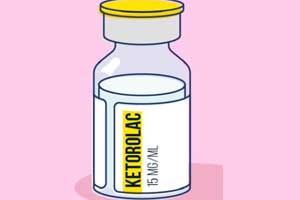- Home
- Editorial
- News
- Practice Guidelines
- Anesthesiology Guidelines
- Cancer Guidelines
- Cardiac Sciences Guidelines
- Critical Care Guidelines
- Dentistry Guidelines
- Dermatology Guidelines
- Diabetes and Endo Guidelines
- Diagnostics Guidelines
- ENT Guidelines
- Featured Practice Guidelines
- Gastroenterology Guidelines
- Geriatrics Guidelines
- Medicine Guidelines
- Nephrology Guidelines
- Neurosciences Guidelines
- Obs and Gynae Guidelines
- Ophthalmology Guidelines
- Orthopaedics Guidelines
- Paediatrics Guidelines
- Psychiatry Guidelines
- Pulmonology Guidelines
- Radiology Guidelines
- Surgery Guidelines
- Urology Guidelines
Ketorolac May Increase Hematoma Risk in Reduction Mammaplasty

Ketorolac exposure may lead to the occurrence of hematoma after reduction mammaplasty. Reduction mammaplasty is the plastic surgery procedure for reducing the size of large breasts. Ketorolac is a potent nonsteroidal anti-inflammatory drug that has valuable analgesic properties.
Dr.Barkho and his associates conducted a study to examine the association between ketorolac exposure and hematoma occurrence after breast reduction surgery. The research was led with a hypothesis that there was no association between ketorolac exposure and hematoma occurrence in breast reduction surgery.
A case-control design was used from 2002 to 2016 in which two sets of data were collected. One set of data consisted of charts of all reduction mammaplasties that developed hematomas requiring surgical evacuation and were compared to another set of data consisting charts of reduction mammaplasty patients who did not indicate this complication (controls). Matching occurred in a 1:1 ratio based on 4 criteria: age, body mass index, institution, and preexisting hypertension. Charts were reviewed for retrospective information on exposure to ketorolac.
The study found that 40 cases of hematoma met inclusion criteria and were matched with 40 controls. Cases had a significantly lower body mass index than controls; however, the other baseline patient demographics were similar between the 2 groups. There was an association between hematoma formation and exposure to ketorolac and a trend for greater risk of hematoma formation, although this was not statistically significant.
The research concluded that there may be an association between perioperative ketorolac exposure and hematoma after breast reduction surgery, but it was not statistically significant. According to the researchers, a larger sample size may increase the precision of the results and may also be able to establish a definite relationship.
The study was published in Plastic and Reconstructive Surgery
For more reference log on to the: doi: 10.1097/GOX.0000000000001699

Disclaimer: This site is primarily intended for healthcare professionals. Any content/information on this website does not replace the advice of medical and/or health professionals and should not be construed as medical/diagnostic advice/endorsement or prescription. Use of this site is subject to our terms of use, privacy policy, advertisement policy. © 2020 Minerva Medical Treatment Pvt Ltd